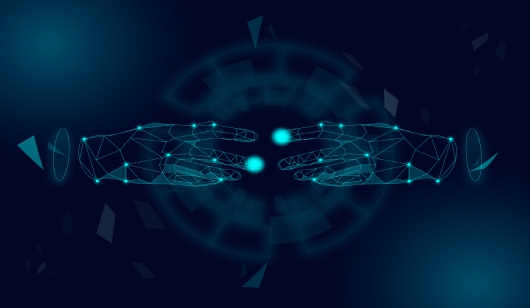-
In the domain of blockchain and decentralized technologies, the convergence of artificial intelligence (AI) and smart contracts has ignited an innovative wave poised to reshape transaction execution and management. This fusion of cutting-edge technologies, AI, and smart contract development, holds the potential to revolutionize industries, streamline processes, and amplify the efficiency and intelligence of automated agreements. Within this comprehensive blog, we embark on an exploration of this emerging type of smart contracts—understanding their essence, benefits, challenges, and transformative influence across diverse sectors.
Comprehending AI-Driven Smart Contracts
Smart contracts, synonymous with blockchain platforms like Ethereum, embody self-executing agreements with contract terms directly inscribed as code. These agreements autonomously initiate and enforce actions upon the fulfillment of predetermined conditions. Conversely, artificial intelligence encompasses the emulation of human cognitive processes by machines, encompassing learning, reasoning, and problem-solving.
These smart contracts amalgamate the capabilities of smart contracts with artificial intelligence technologies, birthing dynamic and intelligent agreements capable of adapting, learning, and making decisions grounded in data and evolving circumstances. This amalgam empowers the automation of intricate decision-making processes within contracts, unshackling new dimensions of efficiency and sophistication.
Benefits
Flexibility
Artificial intelligence-based smart contracts can recalibrate terms and actions in response to real-time data, ensuring agreements remain pertinent and optimal amidst evolving landscapes.
Complex Decision-Making
By integrating artificial, smart contracts can execute intricate decision-making processes, scrutinizing a wider spectrum of variables and rendering informed choices.
Integration of Real-World Data
AI-driven smart contracts can harness external data sources via oracles, augmenting their capacity to respond to real-world events and conditions.
Risk Mitigation
Smart contract development with AI integration can benefit from the capabilities of AI to evaluate risks and anticipate potential challenges. It can enable smart contracts to autonomously implement risk-mitigation strategies.
Efficiency and Precision
AI-driven smart contracts automate tasks and decision-making, curbing human errors and accelerating processes.
Personalization
AI can customize contract terms and actions to individual users, cultivating a more tailored experience.
Also, Explore | An Introduction to Upgradable Smart Contracts
Applications
Supply Chain Management
AI-driven smart contracts can optimize supply chain procedures by dynamically adapting orders based on market dynamics, shipping delays, and inventory levels.
Insurance Claims Processing
In the insurance sector, smart contracts powered by artificial intelligence can facilitate automated claims assessment, fraud detection, and payout computations.
Financial Services
AI's scrutiny of market data and trends empowers smart contracts to execute trades, investment strategies, and loan approvals.
Healthcare
Streamlining medical billing, optimizing patient treatment plans, and automating administrative processes are all within the purview of AI-driven smart contracts in healthcare.
Legal Contracts
AI can aid in the assessment and interpretation of intricate legal documents, ensuring contractual terms align with legal requisites and business objectives.
Real Estate Transactions
Transparent and secure facilitation of property transactions, encompassing documentation management, payments, and transfers, can be orchestrated by AI-driven smart contracts.
You May Also Like | Emerging Smart Contracts Use Cases 2023
Challenges and Aspects to Consider
Data Privacy and Security
AI-driven smart contracts require data access, potentially giving rise to concerns regarding privacy and security, particularly when sensitive information is involved.
Technical Intricacy
AI-driven smart contract development necessitates expertise spanning both AI and blockchain development, rendering it a multifaceted undertaking.
Regulatory Adherence
The integration of AI into contractual decision-making may introduce regulatory and legal complexities, particularly in sectors with stringent compliance prerequisites.
Also, Explore | A Definitive Guide to Understanding Cardano Smart Contracts
The Future of AI-Driven Smart Contracts
As AI and blockchain technologies continue their evolutionary trajectory, the prospects for AI-driven smart contracts amplify in excitement. These contracts could evolve to become more autonomous, adaptive, and proficient at responding to intricate scenarios. Industries that embrace AI-driven smart contracts stand to reap rewards through heightened efficiency, cost reduction, and augmented decision-making prowess. This, in turn, ushers in an era characterized by intelligent automation and pioneering innovation.
Also, Visit | Smart Contracts' Implications in Driving Web 3.0 Revolution
Conclusion
Artificial intelligence-driven smart contracts constitute a momentous stride in the realm of blockchain technology. They signify the fusion of human-like decision-making with the precision and efficiency inherent to automated contracts. While challenges persist, the potential benefits across myriad industries are substantial, laying the groundwork for a future where contracts are not solely self-executing, but also endowed with intelligence and responsiveness. If you have a project in mind related to smart contracts and want to fuse it with artificial intelligence, you may connect with our skilled smart contract developers to get started.

Our Offices
INDIA
Emaar Digital Greens, Sector 61,
Gurugram, Haryana
122011.
Welldone Tech Park,
Sector 48, Sohna road,
Gurugram, Haryana
122018.















